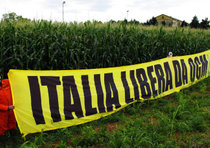Activists storm field, crush GM maize
Crops planted illegally but no globalists'raid condemned
09 August, 16:30

(ANSA) - Pordenone, August 9 - A group of 70 no global activists on
Monday staged a lightening strike against a field of genetically
modified (GM) maize, crushing all the plants and effectively preventing
their harvest.
The GM crop at Vivaro, near the northeastern town of Pordenone, has been
at the centre of a storm for the last two weeks, after the farmer who
planted the maize, Giorgio Fidenato, announced it was ready to be
harvested.
Some 70 activists, dressed alike in white overalls, were able to stomp
on all the plants before police arrived and dragged them away, a
spokesman for the Ya Basta anti-GM group said.
"Our action was aimed against the violence that GM crops wreak on the
environment and on humans," said Luca Tornatore.
Despite widespread opposition to GM crops by most Italian farmers, the
action was nevertheless roundly condemned by all. Pro-biotech group
Futuragra said the raid was "an act of vandalism" and the result of
"terror sown by the media" against GM crops. Farmers' union Coldiretti,
which actively campaigns for organic agriculture, blasted the
anti-globalists, saying that "the law must always be respected".
But Coldiretti also criticised officials for having dallied on the
issue. Last week several members of the largest opposition group, the
centre-left Democratic Party (PD), joined MPs of the governing
coalition's rightwing Northern League party at a press conference
outside the Senate to protest the lack of an "effective response" to the
situation at Vivaro.
An umbrella organization coordinating efforts against the crops, the
Task Force for an Italy Free of Genetically Modified Organisms (GMOs),
which represents 27 conservation, farming and environmental
associations, called for the "immediate destruction of fields where GM
maize is grown".
It warned of a "devastating impact on the local environment, wild fauna
and the crops of other farmers" if pollen from the maize was allowed to
disperse.
Greenpeace attempted to storm the field last week and numerous
representatives from the GMO-Free Italy Task Force erected a protest
camp next to the land.
The governor of Friuli Venezia Giulia where Vivaro is located, Renzo
Tondo, has vowed that the law will be upheld and any infringements will
be dealt with swiftly.
The president of the neighbouring region of Veneto, former Italian
agriculture minister Gianluca Zaia, voiced support for Greenpeace,
warning that cross-contamination from the crop could have a catastrophic
effect on local agriculture.
Agriculture Minister Giancarlo Galan condemned Monday's raid, likening
it to attacks carried out by Fascist thugs.
"I hope police will identify those who took part in it because they are
a group of violent and intolerant thugs of the worst sort," he said,
stressing that officials had been working with local authorities to
analyse the crops.
Fidenato, who heads the pro-biotech Federated Farmers (AF) association,
claims he acted lawfully in planting the seeds and likened GMO critics
to Nazis "with their irrational fears of biological-racial contamination
of the plant species".
Although there is no outright ban on the cultivation of GM crops in
Italy, a long-running legal tangle effectively prevents farmers from
doing so.
Farmers are technically allowed to grow GM crops provided they first
obtain permission under procedures to be drafted by the agriculture
ministry.
However, these procedures have never been finalized.
After months of foot dragging, a 2006 ministry circular eventually
halted the drafting process entirely until regional governments agreed
on local measures to prevent cross-contamination between GM and
traditional crops.
But four years on, regional governments have still not agreed on
definitive coexistence measures and, despite a January court ruling
ordering the ministry to finalize the authorization procedures anyway,
it has not yet done so.
Fidenato started lobbying local officials to allow him to plant GM crops
in 2007 but received no reply.
"At this point, since they haven't said no, I take it I can go ahead,"
he said, shortly after announcing he had planted the GM maize earlier
this year.
The issue of GM crops is particularly explosive in Italy.
As the second-largest producer of organic crops in Europe and the fourth
largest in the world, there is widespread fear of the potential damage
resulting from accidental GM contamination.
Coldiretti has issued several reports suggesting that widespread public
hostility to GM crops would not only damage the domestic market for farm
produce but would also result in a 60% drop in exports.
© Copyright ANSA - Tutti i diritti riservati To subscribe or visit go to: http://www.ansa.it